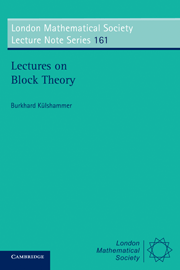Book contents
- Frontmatter
- Contents
- Preface
- 1 Foundations
- 2 Idempotents
- 3 Simple and Semisimple Algebras
- 4 Points and Maximal Ideals
- 5 Miscellaneous Results on Algebras
- 6 Modules
- 7 Groups Acting on Algebras
- 8 Pointed Groups
- 9 Sylow Theorems
- 10 Groups in Algebras
- 11 Group Algebras
- 12 Blocks of Group Algebras
- 13 Nilpotent Blocks
- 14 The Source Algebra of a Nilpotent Block
- 15 Puig's Theorem
- Bibliography
- Subject Index
- List of Symbols
Preface
Published online by Cambridge University Press: 01 June 2011
- Frontmatter
- Contents
- Preface
- 1 Foundations
- 2 Idempotents
- 3 Simple and Semisimple Algebras
- 4 Points and Maximal Ideals
- 5 Miscellaneous Results on Algebras
- 6 Modules
- 7 Groups Acting on Algebras
- 8 Pointed Groups
- 9 Sylow Theorems
- 10 Groups in Algebras
- 11 Group Algebras
- 12 Blocks of Group Algebras
- 13 Nilpotent Blocks
- 14 The Source Algebra of a Nilpotent Block
- 15 Puig's Theorem
- Bibliography
- Subject Index
- List of Symbols
Summary
The notes in this volume are based on series of lectures the author has given at the University of Oxford in winter 1988/89 and at the University of Mainz in winter 1989/90. The aim of these lectures had been to introduce the audience to the new methods in representation theory of finite groups developed in recent years by L. Puig, by giving a complete proof of Puig's theorem on the structure of nilpotent blocks. This result is considered to be one of the highlights in block theory, and is made available here in a textbook for the first time.
In order to make this book accessible to a broad readership we have tried to start from scratch and to give complete proofs of all details. Thus the reader is only assumed to be familiar with the basic notions on groups, rings, fields and modules, including the tensor product. Apart from this our book is self-contained. We have written it in such a way that it can be used for a one-semester course or a seminar on the subject.
We even prove such fundamental results like the Wedderburn-Malcev theorem and the Krull-Schmidt theorem. But although most of the material in the first sections will probably be familiar to many readers we have tried to give proofs different from those in existing textbooks. For example, we stress the central role of idempotents in analyzing the structure of algebras.
Information
- Type
- Chapter
- Information
- Lectures on Block Theory , pp. vii - viiiPublisher: Cambridge University PressPrint publication year: 1991
